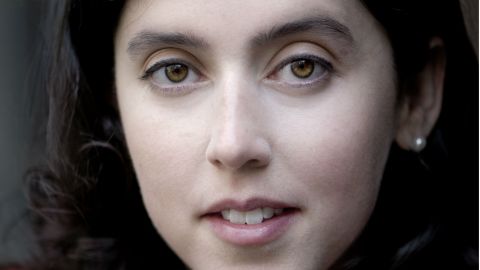Chance Encounters: An Interview With Ai Weiwei Documentary Filmmaker Alison Klayman

Alison Klayman has a confession. When she started following Ai Weiwei around for her latest documentary Ai Weiwei: Never Sorry, she knew nothing about him. Her roommate in Beijing was curating Ai’s photography exhibit in 2008 and she needed a promotional video to accompany the show. Klayman signed up for the job and that chance meeting flourished into a friendship with China’s most famous avant garde artist turned political activist during some of the most tumultuous years of his career.
I caught up with Klayman recently and she told me about the moment she realized she was in the presence of a star.
Is Ai Weiwei an activist or an artist?
Alison Klayman: That was one of my major driving questions as I began to film this. What I realized over watching him give countless interviews was that I don’t think he ever takes off his artist hat. I think, yes, he is an activist, he is a political commentator, he is an organizer. He’s a public intellectual. He is all these things and he’s involved with a lot of things that are activist pursues or human rights pursuits, but he’ll be in the middle of a conversation about the Internet or about the problems in contemporary China, whatever it is, but he will say, you know, I’m an artist. I’m an artist by profession.
My takeaway from the documentary is that he seems to genuinely care about the social ills and the people of China. How do you think he loves China differently from, let’s say, the communist party, the Chinese government or an ordinary citizen in China?
Alison Klayman: That’s a really good question. The immediate thing that I thought of is the concern for individuals and individuality, dignity of individual life, individual thought and expression. Often times there is a fair amount. Certainly the communist party, as I understand it, is the idea that communism is about the collective and it’s not about an individual. Clearly now China’s not a communist country. But I think the way the party operates, there is kind of this justification that maybe things happen because it’s for the greater good and for the greater progress. Often that stamps out individual rights. I think that might be the big difference. Ai Weiwei says I don’t want to talk about a country’s progress that doesn’t include these individual rights.
What do you think it will take to truly effect the kind of change that he has in mind for China? When do you think it will happen and how do you think it will play out?
Alison Klayman: It’s the Internet. I really think it is. It’s funny because I listened to Ai Weiwei talk about the Internet for like two years and I feel like it wasn’t until I started editing that I synthesized everything and really got it. I filmed him doing it and heard him give these answers and I don’t think I really got it until much later, but I’m a pretty firm believer.
It’s free speech, free expression, the desire to speak the truth and to get information out and have conversations. By virtue of the way that this technology works it will always manage to find a way to be one step outside of the censors’ grasp. It’s as long as people have the will. That’s why I think that’s what this movie is really about. It’s about individual courage.
It’s the first step, the freedom of expression it starts with like the freedom of expression in your mind. Because if you’re censored, if you censor yourself and don’t even try to speak out because you’re worried about what’s going to happen to you, then there’s no like first step. You need that first step and I think that’s what you see in Ai Weiwei and all the people around him in the film.
What made you realize that this was a story worth documenting?
Alison Klayman: It really was the force of his personality. He said things that surprised me, even in these first few weeks. I got so much material in those first few weeks that did not fit into the framework of this video for the gallery. We were talking about censorship and his blog and his upcoming earthquake campaign. Just the things he felt about contemporary China, which even that didn’t really fit in New York photographs. I mean, there was some really interesting ideas in that, but his thoughts on contemporary China — there was so much there and he was so bold and unequivocal about what he said. The thing that was even crazier is you knew he was saying that on his blog too. So it was like, how are you doing these things?
Was there an ah-ha moment?
Alison Klayman: Dramatic things were happening with him and then I went to his show in Munich, which was sort of the biggest show of his career and he really has a very big audience in Germany. I mean, that’s probably the country where he has the strongest awareness of him and fan base in terms of the west.
And that I remember as an ah-ha moment because it was this feeling that like, whoa, this guy that I’ve been like filming and kind of trying to be around, he is really famous. It felt like he kind of had an entourage. He had a presence within his work space. When he was in a room, it’s like you know he’s the boss.
When you realized what a big deal he is, did that change the way you approached the project? Suddenly, you have this huge responsibility in your hands.
Alison Klayman: It was really his detention that for me was the moment that was above any other moment. It raised the stakes for this project. I come with a journalist background and I always felt like I had a responsibility. I have a responsibility to find out as much as possible to make sure all the information is fair and true.
But now we’re talking about a life or death situation. We don’t know where he is, we don’t know what’s going to happen to him, and now everyone knows about him.
When all your taping and your reporting was done, how did you craft his story? What did you have to leave out?
Alison Klayman: My goal was kind of to try to do a like ‘fly on the wall,’ vérité kind of thing. It’s not fully vérité because there are interviews. But there are some scenes where something happened and I was there capturing it. I’m not engaged in it; I just was there. So what I wanted to do was show what happened to him over the last few years and dip into his biography throughout.
There were certain moments that I always knew would be a scene, like his mom coming over. And in the end, there’s a lot more of my conversation with her and her talking with Weiwei. A lot of what gets cut out is really just about flow of the film. I don’t want the movie to drag at any point and I just want people to feel like they want to keep watching.
I also did not want the movie to be a story of the realization of one particular artwork. I didn’t think there was any one artwork in this period of time that was like “That’s what these last few years were about.” In essence, I wanted to capture these last few years. What I lucked out on is that how important these last few years were.
You couldn’t have met him at a better time.
Alison Klayman: That’s only luck. What do they say? Luck is when preparation meets opportunity. I wanted to do something like this and I also worked really hard and brought a lot of standards to how I was going to accomplish this. But also, I was making it up as I went along. I had no idea.
Ai Weiwei: Never Sorry – a documentary by Alison Klayman, opens Friday, July 27th in New York, Los Angeles, San Francisco, Washington, DC and Bethesda, MD





